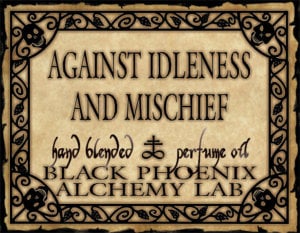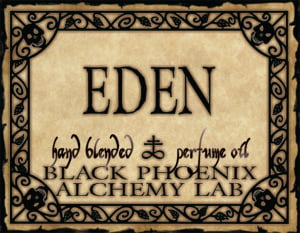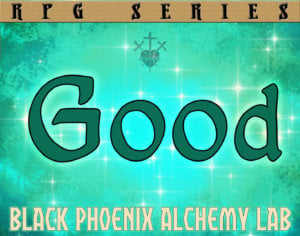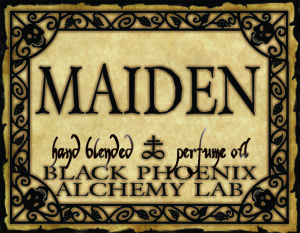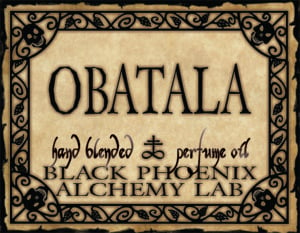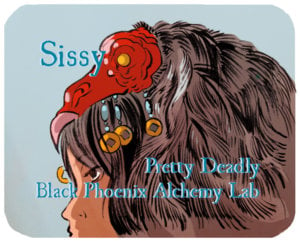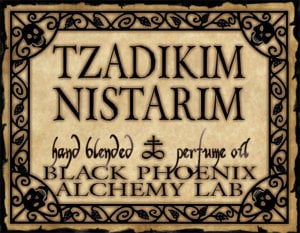Goodness
-
Against Idleness and Mischief Perfume Oil
Select Options This product has multiple variants. The options may be chosen on the product pageHow doth the little busy bee
Improve each shining hour
And gather honey all the day
From every opening flower!How skilfully she builds her cell!
How neat she spreads the wax!
And labours hard to store it well
With the sweet food she makes.In works of labour or of skill,
I would be busy too;
For Satan finds some mischief still
For idle hands to do.In books, or work, or healthful play,
Let my first years be passed,
That I may give for every day
Some good account at last.Pollen-dusted honey, diligent tonka, steadfast chamomile, and goodly hyssop.
-
Eden Perfume Oil
Select Options This product has multiple variants. The options may be chosen on the product pageAt the center of the Garden of Eden stands the Tree of the Knowledge of Good and Evil. Though modern interpretations of the Bible claim that it was an apple that the Serpent of the Tree offered to Eve, it is widely believed that the true Fruit of True Knowledge was, in fact, a fig.
This oil contains the innocence of the Garden, coupled with the Truth and Erudition found in the fruit of the Tree of Evil: fig leaf, fig fruit, honeyed almond milk, toasted coconut and sandalwood.
-
Good Perfume Oil
Select Options This product has multiple variants. The options may be chosen on the product pageShimmering celestial musk with vanilla, white honey, acacia, and sugar cane.
-
Maiden Perfume Oil
Select Options This product has multiple variants. The options may be chosen on the product pageA gentle vision of purity, goodness and virtue: white tea, carnation and Damask Rose.
-
Obatala Perfume Oil
Select Options This product has multiple variants. The options may be chosen on the product pageThe King of the White Cloth, King of the Orishas, the First Among Equals. He is the King of Power, and his weapon is wisdom. He is the essence of honored maturity, wisdom through age and experience, purity of intention, virtue, humility, tolerance, judicious use of power, the knowledge of what is truly right and wrong, the moral code, and the obligation to do what is right. Obatala is the Creator God, who first fashioned mankind from clay; thus, he is also the first sculptor and potter. The human head itself is Obatala’s creation, and it is through it that he grants us the ability to discern genuine morality as opposed to oppressive, mistaken and arrogant self-righteousness. His is not the falsehood of societal boundaries, His Truth is the understanding of one’s own character and the obligations that we all have to our world, our Gods, and one another. He is the Benevolent Judge, calm and lucid, and he governs rational deliberation. His color is white, as His spirit is free from any soil or stain, and His energy radiates sanctified purity, great wisdom, happiness and internal peace. He is associated with cloth, as that was one of His gifts to mankind. The aspects of Obatala are symbolized by the chameleon, boa constrictor, elephant, gorilla, and snail. Obatala is the Lord of Laughter, for it is through wisdom that one may see the joy in life, and through laughter we are able to see the follies of mankind not with cynicism and derision, but with humor, compassion and understanding. Obatala’s Laughter helps soothe the pain of life’s rigors, and takes the sting out of the harshest of life’s lessons. Obatala’s ofrenda is soft, white and pure: milk, coconut meat, shea butter and cool, refreshing water.
-
Sissy, The Ascendant Perfume Oil
Add to cartSassafras and smoke for black vulture feathers, and King mandarin and red musk for the deep red-orange of the vulture’s face. Blue lilac and chamomile / opoponax and vetiver for the blue and black of her eyes. Vanilla bean and fig represent her innate goodness and instinctive kindness.
-
Tzadikim Nistarim Perfume Oil
Out of Stock This product has multiple variants. The options may be chosen on the product pageAlso called the Lamed Vev, two letters in the Hebrew alphabet that translate to the number thirty-six. In this violent, ugly, strife-riddled world of ours there are thirty-six men, the Hidden Just Men or Hidden Saints, who bear on their shoulders the burden of all our pain, sorrows and sins. The Tzadikim Nistarim move in obscurity, and are usually found among the poor, the downtrodden and the meekest among us, and are chosen for this task because of their righteousness, stalwart sense of genuine justice, and the true goodness of their souls. When one of these men dies, God chooses another to take his place. It is for their sake and for love of them that God does not destroy His imperfect creation. As long as the Lamed Vav serves humanity, the world will continue to plod on, but once one of them dies and God cannot find another worthy to take his place, the world will be destroyed. In Qabala, the thirty-six men of the Tzadikim Nistarim together combine to symbolize the seventy-two bridges, corresponding to the seventy-two names of God, that connect the concealed and revealed worlds of our universe.
The scent is one of unadulterated spiritual purity, with a taste of the world’s eternal pathos, and the joy of suffering with grace: frankincense, olive, spikenard, hyssop and galangal.
